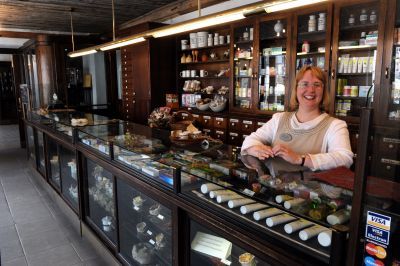Ancient Estonian drug store offers sweet cure for broken hearts

An ancient pharmacy in the Estonian capital promises a sweet cure for broken hearts: an almond-based concoction dating from medieval times that claims to ease the pangs of love.
"Since the Middle Ages a special marzipan prescription has been prepared and sold here for the heart to relieve the pain of love," said Ulle Noodapera, a pharmacist at the Raeapteek drug store which first opened for business in Tallinn's old town square in 1422.
It is believed to be Europe's oldest pharmacy, in operation for 588 years.
"We keep making the special marzipan because the need for such a medicine has continued over the centuries, and patients with symptoms of love pain keep turning up seeking the cure," she added.
The ancient recipe is a jealously guarded secret.
"It's not ordinary marzipan, but one made using a medieval prescription containing 72 percent almonds and 28 percent other ingredients that we will not disclose," Noodapera said.
One dose of the wonder drug weighs 40 grams (1.4 ounces) and costs just one euro (just over one dollar).
Stepping into Tallinn's ancient drug store feels like a journey in a time-machine.
Along with the cure for broken hearts, a room in the store displays many other medieval potions used for centuries for their supposedly miraculous impact.
Most of these remedies are not sold anymore, but the display on old shelves is impressive: dried frogs' legs, pike's eyes, powder supposedly from the mythical unicorn, black cat's blood, the grease of dirty sheep's wool, pieces of an overseas mummy, dew-worm in oil, burned bees, wolf's gut and rabbit hearts - the last prescribed to restore sanity.
"We might think it's funny and ridiculous but there were always reasons why something was recommended by doctors at that time and sold at the drug store," Noodapera noted.
"For example, those with vision problems were advised to buy valeriana because it was believed that cats - known for very good eyesight - have good vision because they like valeriana," Noodapera said.
Another item still on sale since the Middle Ages is a lamb's wool called Rose, meant to ease backaches.
The pharmacy also reflects Tallinn's colourful multinational background over the centuries.
Opened by a German doctor, Johan Molner, in 1422, it passed into the hands of a Hungarian doctor named Johann Burchart Belavary de Sykava in 1580 and was run by the Burchart family for the next 300 years.
At times, it doubled as an elite club for city fathers where alcohol flowed freely - literally. In the Middle Ages, Noodapera said, pharmacists also sold alcoholic drinks and convention required they give a certain amount free of charge to city rulers.
In those days, "the drug store also functioned as a kind of closed club for Tallinn city rulers who liked to gather there after meetings at Town Hall, which is still located on the other side of the old town square," Noodapera said.
"Meeting behind the closed doors of the pharmacy gave the city rulers more privacy to party than in local pubs."
Today, the Tallinn pharmacy also deals in modern drugs and pharmaceuticals. For tourists, the best-selling "remedy" is a wine called Klaret made using a medieval recipe, with eight different spices and 14 percent alcohol.
A 450 millilitre (15 fluid ounces) bottle costs 16 euros (22 dollars).
Join our commenting forum
Join thought-provoking conversations, follow other Independent readers and see their replies
Comments
Bookmark popover
Removed from bookmarks